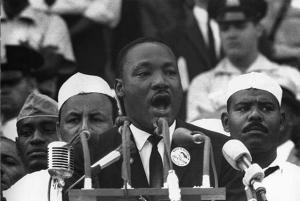
Monday was Martin Luther King Jr. Day in the United States, when we remember a man who was committed to the cause of justice through nonviolence. It’s a day where those of us who are white tend to post black and white pictures of Dr. King looking all preacher-y and visionary, along with a nice, safe quotation that speaks very generally about love or peace or equality.
We’re big fans of Martin Luther King Jr.
That is, as long as he’s speaking at arm’s length, in generalities, or about people at whom we can look down our noses in disapproval—you know, those bad racists back in the sixties.
In a Box
We do like to keep Martin in a safe, tidy little box, don’t we? And then on one particular Monday every January, we lift the lid so everyone can see how we’ve taken such good care of him over the past year, tucked away in the corner of the closet.
It’s long past time for us, especially we who are not people of color, to quit whitewashing Martin Luther King Jr. and instead allow him to speak some prophetic discomfort into our lives. To start us off, here are five challenging quotations that most people would never have guessed were said or written by Martin Luther King Jr. In fact, if he were to have said or written them today, many who celebrate the “safe” version of him on display once per year would denounce him instead. They would call him anti-American, or a socialist, or anti-police.
Or Fox News’s new favorite slur-that’s-really-a-compliment: “woke.”
1. “True compassion is more than flinging a coin to a beggar. It comes to see that an edifice which produces beggars needs restructuring.” —from the sermon “A Time to Break Silence,”given at Riverside Church NYC (1967)
So many in the American church are generous individually—even if they choose not to give directly to people flying signs on the street, they will donate to charitable causes, or to foundations that help support human services nonprofits.
Don’t get me wrong, that’s a good thing.
It’s important to help those experiencing homelessness or extreme poverty or substance use issues make it to the next day. And I can tell you from personal experience as a case manager that we in the nonprofit human services sector depend so incredibly much on grants and individual gifts. With those, we can help folks break whatever cycle in which they’re trapped and get a leg up on beginning a better life.
But as soon as we begin asking “what can we do to make sure people don’t get to that point in the first place?” these same Christians often become automatically opposed. They cite the Bible, telling us that Jesus often spoke of assisting others, but not creating entire systems to act as a safety net. They balk at things like SSI, universal health care, SNAP, free school meals, and other sorts of assistance they regard as welfare.
Jesus Was Subversive
What they miss is that Jesus did subvert systems that held people down or were oppressive. He ate with untouchables like tax collectors and sex workers. He included women in his inner group of followers. He healed lepers who were banished to the edges of society. He reinterpreted the law to include foreigners and enemies as those worthy of God’s love and our help, and in the parable of the Good Samaritan expanded their society’s understanding of what constitutes a neighbor. Suddenly, “love your neighbor as yourself” included showing love and concern for all people, not just those who were good Jews.
Neither Jesus nor Martin Luther King Jr. were content to put a bandaid on the problem of human suffering, but rather worked to change the systems that led to it.
2. “I think that we’ve got to see that a riot is the language of the unheard.” —from the speech “The Other America,” given at Stanford University (1967)
Is MLK excusing rioting? No. There’s a difference between excuses and reasons, and here he’s simply pointing out a primary cause of riots: when a people go unheard. When they plead for equal rights, for equal treatment, or equal opportunities—and society simply ignores them.
Over time, feeling unheard becomes feeling frustrated. And that frustration eventually transforms into a rage which sits just below the surface but grows with every micro-aggression and every case of injustice on the news. Suddenly, the country is sitting on a powder keg that threatens to explode—all it takes is one event to light the fuse.
Our response as Christians? Of course we are called to work for peace when tensions do flare up, but we maintain a duty to our neighbors to listen so that they don’t in the first place. Paul once compared the church to a body—if a person breaks their arm, they listen to what their arm is telling them and pay special attention to that arm. But if we ignore it and tell ourselves “All parts of the body matter,” what’s going to happen to that arm? Of course every body part matters, but if we don’t tend to that arm, if we don’t pay attention to the signals it’s giving us, it’s going to negatively affect the rest of the body.
3. “Of all the forms of inequality, injustice in health is the most shocking and inhuman.” — from a speech at the convention of the Medical Committee on Human Rights (1966)
Unequal access to health care, unequal access to insurance, deductibles and coinsurances that could bankrupt a working-class family but that a family with money can afford just fine, medical insurance companies operating for a profit and answering to their shareholders rather than to doctors and their patients…it’s been said ad nauseum, but our healthcare system is broken. And this isn’t just an economic or political issue—it’s a spiritual one. “The love of money is the root of all kinds of evil,” Jesus warns us. Nowhere is this truer than when it comes to people’s health, and in fact their very lives. Allowing such a disparity in both access and affordability is a sin. Like, literally, a sin.
Where might Dr. King have landed on the queation of universal healthcare? Or medication price caps? It does give one pause.
4. “Whatever affects one directly, affects all indirectly. I can never be what I ought to be until you are what you ought to be, and you can never be what you ought to be until I am what I ought to be…This is the inter-related structure of reality.” —from the Commencement Address at Oberlin College, 1965
There is a Bantu word for what Dr. King is describing here: Ubuntu. This idea that we’re all interconnected, that we are interdependent, that our full realization as human beings comes only when we are in relationship with others—it really flies in the face of the American ideal of rugged individualism. And yet, it’s the philosophy that Jesus lived and taught during his earthly ministry. Love your neighbor, because your well-being is caught up in theirs. Care for the vulnerable. Welcome the foreigner and the outcast. Visit the prisoner, clothe the naked, feed the hungry. By affirming their humanity you are living the “life to the fullest” that God wishes for each of us.
That also means that our individual rights don’t take precedence over our collective responsibility, and this is where both MLK and Jesus are at odds with what we would think of as typically American values. To understand our own individual identity as bound up in how much of an opportunity our neighbors have to live out their own full humanity…well, that puts a bit of a spin on the Second Amendment, doesn’t it? Or student loan forgiveness. Or LGBTQ+ rights. Or any of a myriad of other “woke” issues.
5. “A nation that continues year after year to spend more money on military defense than on programs of social uplift is approaching spiritual doom.” —from Beyond Vietnam: A Time to Break Silence (1967)
According to the Air Force, the average cost of their newest fighter, the F-35, is $82.5 million.
- Three of these planes could fund the entire SNAP (food stamps) program in my home state of Nebraska.
- Forty different states receive less annual funding from HUD designed to fight homelessness than the cost of one plane.
- The cost of eight planes could fund the entire United States Summer Food Service Program for a full year.
I grew up in a military family, and I recognize the need for a strong military in today’s world. But I also currently work for a non-profit which assists people experiencing homelessness in securing and keeping stable housing. I look at the incredible work my colleagues in many, many agencies do on small budgets for not nearly enough pay, and I can’t help but wonder how much more of a difference we’d be able to make for the cost of one single F-35 fighter.
I get it. A modern, effective military is expensive. But I watch as politicians increase military spending (already the largest line item in the federal budget by far) while at the same time fighting tooth and nail to decrease what is in relative terms a pittance for social spending.
And then I see these same politicians claiming that the United States operates with Christian values.
I wonder if they’ve ever actually read the Sermon on the Mount.













